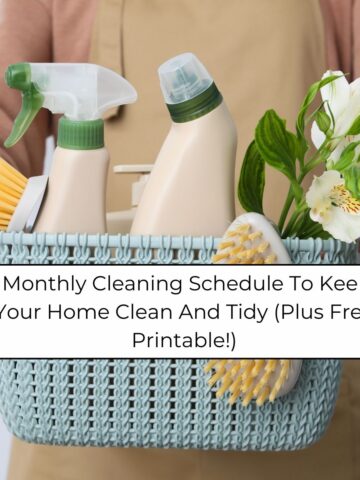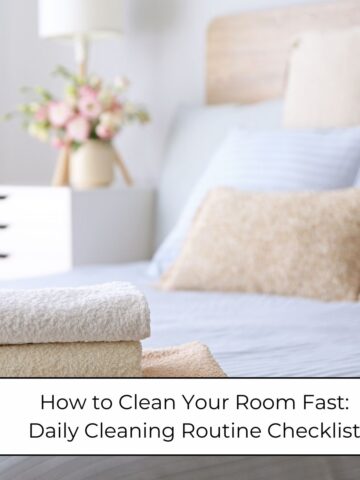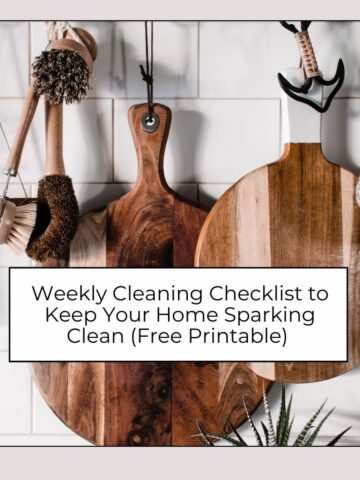Hello, joyful homemaker!
Let’s be honest—who actually enjoys cleaning windows?
I used to dread it. Between the streaks, the harsh chemical smells, and the underwhelming results, it always felt like a task better left for “another day.” But then I had one of those moments—you know, when the afternoon sun hits just right and suddenly your windows are exposed for what they really are: cloudy, dusty, and definitely overdue for a good cleaning.
Keeping our windows clean and streak-free isn’t just about appearances. It’s an important step in maintaining a healthier, more inviting home for my family.
While I’ve experimented with various commercial glass cleaners in the past, I’ve finally found my go-to: a homemade glass cleaner that’s not only more effective, but also safer and far more budget-friendly. And honestly? I couldn’t be happier with the switch!
The Importance of Clean Windows
Cleaning windows might be one of the chores you put on the back burner, but there are so many good reasons why we need to keep our windows clean:
1. Prevent damage
Regularly cleaning your windows can help prevent glass damage due to acid rain. Dirt, grime, and hard water can penetrate the structure of your windows, eventually causing damage. Without regular cleaning and maintenance, you'll have to replace your windows at some point.
2. Improve indoor air quality
The buildup of dirt particles on your windows soon turns into mold. Mold poses serious health risks, including allergic reactions and irritations to the eyes, skin, nose, and lungs. I personally relate to the frustrations of dealing with these allergic reactions as my son gets them whenever exposed to dust and strong scents. Cleaning windows regularly and switching from a commercial cleaner to a homemade DIY window cleaner is essential in maintaining my family's health.
3. Added visual appeal
Having clean windows also boosts the vibe and look of your home. Dirty windows block direct sunlight, making the house look dark and gloomy. But when you have clean windows, natural light floods your home, giving it a more welcoming, cleaner, and fresher look!
Best homemade window cleaner recipe
You might not believe it, but this homemade window cleaner recipe uses only simple ingredients you probably already have in your kitchen! It’s not just great for interior and exterior windows—it also works wonders on mirrors, glass shower doors, and other glass surfaces around your home.
Here are the basic ingredients you’ll need to whip up your own effective (and budget-friendly) glass cleaner:
1. Distilled water
Distilled water is purer than hard or tap water, so it's free from mineral deposits that leave streaks and residues.
2. Distilled white vinegar
Vinegar's acetic acid makes it a cleaning superstar in and around the home! Distilled white vinegar effectively breaks down dirt and grime, making cleaning windows much easier. It also has antimicrobial properties, so it kills bacteria on surfaces.
3. Rubbing alcohol
Rubbing alcohol's quick drying time, degreasing power, and antibacterial properties make it an excellent element in your homemade glass cleaner. It is wise to use 70% isopropyl alcohol as it has more water content than 90% solution, leaving enough time to inspect and remove water stains and window streaks before they dry up.
4. Dishwashing liquid
Adding a small amount of dish detergent into your cleaning solution amplifies its degreasing power. Dish soap's degreasing power allows it to break down dirt, grease, and grime on windows. If you're cleaning greasy windows, such as in and near your cooking area, try the homemade window cleaner with dish soap recipe!
5. Cornstarch
Cornstarch is a natural abrasive, so it helps lift away dirt and grime without damaging the window's surfaces. It also polishes your windows, giving them extra shine and streak-free!
7. Essential oils (optional)
Adding essential oils to your homemade window cleaner is not required, but you may consider it if you can't stand the temporary smell of vinegar-based cleaner.
Basic Homemade Window Cleaner
To create your homemade window cleaner, you will need:
- half a cup of distilled white vinegar
- 2 cups of distilled water
- a few drops of essential oils (optional)
Pour distilled white vinegar and water into a glass spray bottle. Shake to mix. Add a few drops of essential oils of your choice (5-10 drops). Your homemade window cleaner is ready to use.
Homemade Window Cleaner Recipe With Rubbing Alcohol
Apart from the basic DIY window cleaner recipe mentioned above, you can follow a few variations or formulas. This homemade window cleaner recipe has 70% isopropyl rubbing alcohol. You need:
- ¼ cup rubbing alcohol
- 1 cup distilled water
- 3 tablespoons distilled white vinegar
Pour the ingredients into a spray bottle and shake to mix.
Homemade Window Cleaner With Dish Soap
Some people also like using dish soap to make their homemade glass cleaner. In this recipe, you need:
- 4 drops of dishwashing liquid
- 1 cup distilled water
- 1 cup white vinegar
Pour equal parts of distilled water and vinegar into a spray bottle and shake well. Add 4 drops of dish soap and gently shake to mix all the ingredients.
Homemade Window Cleaner with Cornstarch
Did you know that cornstarch can be used as a gentle abrasive to effectively clean the grime off your windows without leaving any scratches? The fine particles in cornstarch act as a natural polishing agent, making it an ideal solution for keeping your windows crystal clear.
For this homemade cleaner recipe, you need:
- 2 cups distilled water
- ¼ cup rubbing alcohol
- 1 tbsp. cornstarch
- ¼ cup distilled white vinegar
Pour all the ingredients into a spray bottle and shake to mix. Give the bottle a good shake each time you need to use it.
Note: I have found some homemade cleaners using white vinegar and baking soda. Although I also use baking soda in some of my DIY glass cleaners, such as in this homemade toilet bowl cleaner, I put them into separate containers. You'll notice a fizzing reaction when mixed together, and while it is not entirely dangerous, I recommend avoiding mixing them in one container.
How to Use Homemade Glass Cleaner
Now that you've learned how to use different types of glass and window cleaners, it's time to put them to use. Here's the step-by-step process of using a DIY window cleaner.
- Gather all your tools and materials for cleaning the windows. Bring your homemade glass cleaner, squeegee, clean and dry microfiber cloth, or lint-free rags.
- Clear the windows of dust, dirt, and debris. Before proceeding to the next step, wipe it with a dry microfiber cloth.
- Apply your homemade window cleaner. Spray the windows with the cleaning solution evenly.
- Let the glass cleaner sit on the windows for a few minutes and let it do its magic.
- Now, it's time to wipe. Use a dry clean microfiber or lint-free cloth to wipe your windows.
- You can also use a squeegee or just wipe clean with another rag.
- Enjoy your clean, streak-free windows!
Tips and Tricks for Effortless Window Cleaning
It's really easy to make and use a DIY glass cleaner. But to make sure you're doing it correctly and increase your chances of successfully cleaning your windows, keep these window-cleaning tips and tricks in mind:
- Use distilled water. These DIY window cleaners call for water, but we're very specific in using distilled water instead of tap water. Tap water typically contains mineral deposits that leave streaks and residues behind once the water evaporates. Distilled water, on the other hand, is purer so it's perfect for cleaning any glass surface, streak-free!
- Clean windows on a cloudy day. It might seem counterintuitive, but there's a good reason why it's best to clean windows on a gloomy day. Without the sun shining brightly as you clean, your windows dry much slower. This lets you wipe the cleaning solution before it dries up, giving your windows a streak-free shine.
- Use cornstarch for stubborn stains. This is an incredible hack to follow, especially if your windows have too much dirt buildup and stubborn stains. Cornstarch is a gentle abrasive, so you can scrub the windows without damaging their glass surface.
- Always use a lint-free microfiber cloth. Paper towels leave a residue, so it's always best to use clean dry microfiber towels when wiping your windows.
- Use homemade window cleaner with dish soap for greasy windows. Dish soap's grease-cutting properties will leave your windows clean and sparkly. Be
En - Use homemade cleaning solution with rubbing alcohol when dealing with overly dirty windows.
- Store your glass cleaner away from sunlight. Remember that glass cleaners with alcohol are flammable, so it's wise to put them away in a cool, dark place, away from children and pets' reach.
- Do not use your homemade window cleaner on granite and marble countertops, or for cleaning hardwood floors, electronics, and waxed furniture. Limit the use of this DIY cleaner on windows and other glass surfaces.
Key Takeaways
You don't need to use harsh chemicals when cleaning your windows. All you need are natural ingredients that are safe and cheap to give your windows a clean and streak-free shine! With distilled water, white distilled vinegar, rubbing alcohol, and some dish detergent, you can make your homemade version of window cleaner quickly and cheaply!
Now that you have the best homemade window cleaner, you don't have to dread cleaning windows and other glass surfaces! So, embrace the process, enjoy the shine, and revel in the fact that you've just added another skill to your homemaking arsenal. Happy cleaning!








